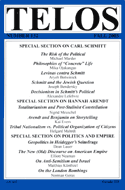As an occasional feature on TELOSscope, we highlight a past Telos article whose critical insights continue to illuminate our thinking and challenge our assumptions. Today, Charles Kollmer looks at Kai Evers’s “The Holes of Oblivion: Arendt and Benjamin on Storytelling in the Age of Totalitarian Destruction” from Telos 132 (Fall 2005).
 A central concern of critical theory revolves around the difficulty of communicating in the wake of modernity’s crises. Unprecedented trauma and violence obliterate tradition, which historically formed the necessary context for lucid and comprehensible stories. Walter Benjamin famously observed that veterans of World War I returned “not richer but poorer in communicable experience.” In the wake of the war, he notes, the word bekanntlich, or “as everybody well knows,” lost its currency, leaving only Erfahrungsarmut, “the new poverty of experience.” In response to this situation, Benjamin valorized the anti-aesthetic manifest in the works of Karl Kraus and Berthold Brecht, concluding that “all that remains is the discipline of those who destroy.” A similar current of thought underpins many of the philosophical and aesthetic developments in postwar culture, from the Frankfurt School’s critique of Enlightenment empiricism to the Dadaist rejection of canonical artistic authority.
A central concern of critical theory revolves around the difficulty of communicating in the wake of modernity’s crises. Unprecedented trauma and violence obliterate tradition, which historically formed the necessary context for lucid and comprehensible stories. Walter Benjamin famously observed that veterans of World War I returned “not richer but poorer in communicable experience.” In the wake of the war, he notes, the word bekanntlich, or “as everybody well knows,” lost its currency, leaving only Erfahrungsarmut, “the new poverty of experience.” In response to this situation, Benjamin valorized the anti-aesthetic manifest in the works of Karl Kraus and Berthold Brecht, concluding that “all that remains is the discipline of those who destroy.” A similar current of thought underpins many of the philosophical and aesthetic developments in postwar culture, from the Frankfurt School’s critique of Enlightenment empiricism to the Dadaist rejection of canonical artistic authority.







